
No cat of any breed is invincible. While some may have good genes and be provided with a loving and safe environment, the nature of illness means it can affect anyone, even if you're a cat. As pet owners, it is our duty to keep an eye on any issues our cat may be going through so we can find the right treatment to restore their health. We do this from the very beginning by having vaccination and deworming schedules, as well as neutering our cats if we can't provide sufficiently for pregnancies.
After this basic care comes regular check ups at the veterinarian. Annual check ups are the minimum, but biannual visits are recommended. After this, apart from ensuring your cat's psychological and physiological needs are met in general, you should be monitoring specific symptoms. This is why AnimalWised shares information on how to know if your cat is sick by telling you what to look out for.
1. Study their general demeanor
When a cat is sick, like us humans, their bodies will begin to show it. It may not be very specific, but you will notice some subtle changes to begin with. Firstly, you will notice they start to sleep more than usual. If you think your cat may be sick, you can look out to see if they are sleeping more than usual. This may be difficult if you have a normally quite lazy cat, so another thing to look out for is their appetite. If they are eating much less than usual, it is a possible sign of illness in your cat.
If they are not hydrating with enough water either, this is a sign there may be a health issue. When a cat refuses to drink, this is usually when something quite bad is wrong. It could be a possible sign of poisoning, so if your cat loses their thirst and appetite completely, you should take them to the vet immediately.
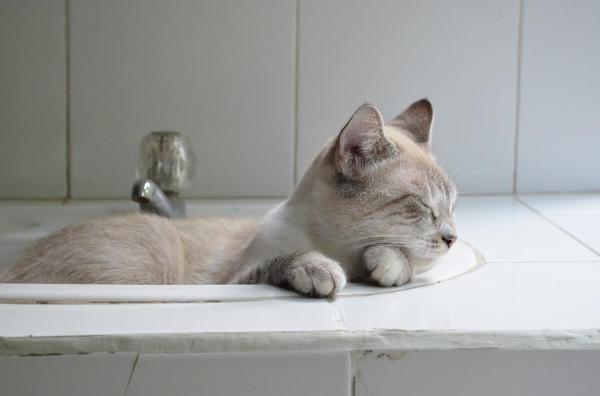
2. Rule out a fever
Cats will not sweat in the same way as humans when they have a fever, at least not often noticeably. This is why you need to look out for other external signs. Often they will have a warm dry nose when they have a fever, but this could be to other reasons also. This is why, if you suspect a fever, you need to take their temperature. This is done anally, so it is often a delicate procedure as they may find it uncomfortable. If they do, it is common for them to scratch and bite.
A cat's normal temperature should be somewhere between 37.5 ºC and 39 ºC (99.5 ºF and 102.2 ºF). If their temperature is above 39 ºC, then it is a clear sign of fever ad you should take them to the vet. It is possible they have an infection or are suffering from some other sort of disease. When a cat has a fever, they lose their shine.
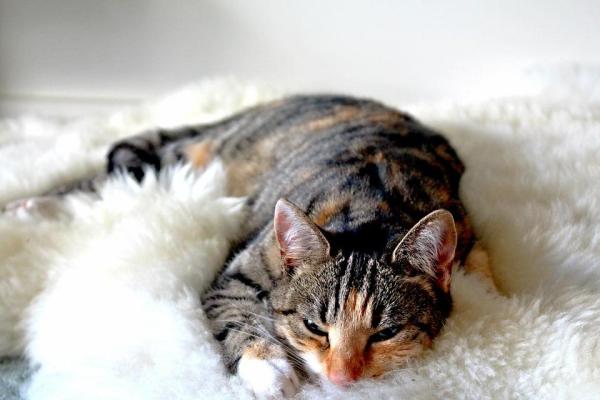
3. Check their urine and faeces
The amount your cat urinates is important to know if they are in good health. Too much or too little urination could indicate a problem with kidneys or their bladder. The frequency of urination and defecation is not the only concern as urinating outside of their litterbox can indicate an incontinence problem. This is, of course, if they had been using their litterbox appropriately previously. Going outside of the tray can also be related to a psychological issue, but bringing your cat to the vet is the best way to diagnose the problem either way.
When you suspect your cat is unwell, you should observe their stools to determine is they are normal. There are two clear signs of a problem. Firstly, the cat may have diarrhea. Secondly, they may have blood in their stool (or urine). Take your cat to the vet if you see blood in their stool or if they have repeat cases of diarrhea. However, not defecating at all is equally troubling, especially if it has been more than two days. This is something which is harder to monitor if they are outdoor cats.
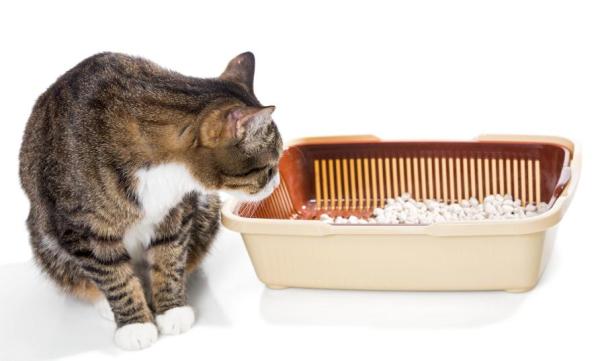
4. Does your cat vomit?
In most cases, if your cat has nausea, then there is little reason to be scared. It is often because they have a hairball or have eaten something which they need to purge. You will notice soon enough after seeing signs of nausea in your cat that they expel something and feel much better afterwards. However, if your cat is dry heaving without anything coming out, it could be a sign of some obstruction. Whether this is in their oesophagus or some other part of their digestive tract, you should seek a vet.
If your cat vomits several times during a day, you need to go to the vet immediately. It could be anything from eating something toxic to an intestinal infection or kidney problem.

5. Do they purr loudly?
If your cat is purring loudly, and it is not otherwise a very vocal cat, then it is a sign they are trying to tell you something. Cats don't communicate with each other through meowing, except when they are kittens. This means they are trying to speak to you. If they are ill then, this could be what they are trying to say. Some breed species may meow more than others, such as the Siamese cat.
When this happens, you may want to make a brief examination of their body. Lighting press around their body to explore for lumps, inflammation or wounds. Take their temperature and then take them to the vet.
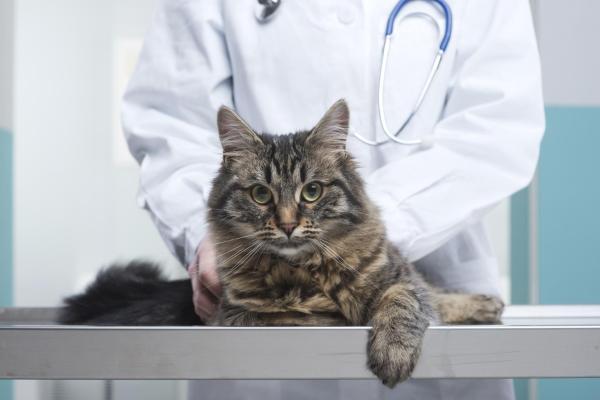
6. Check if their breath is abnormal
If your cat has foul breath, it could be to a number of issues. Of course, if they have just eaten something which smells, you need to ensure this isn't the source of the smell. It can be a sign of infection or inflammation such as gingivitis, dental problems or even kidney failure. If their breath is fruity or obviously pungent, then this can be a bad sign. Your vet will be able to diagnose the problem as well as advise on treatment. If it is an infection, they can advise on medicine, but they may also suggest a dietary change.

7. Do they drink excess water?
If you observe your cat drinking excess water, then there could be an underlying pathology which needs taken care of. Diabetes is one of the most common causes of your cat drinking excess water. Kidney problems are another possible reason. Eating too much could be a problem also as they may have a parasitic worm which is taking some of their nutrients. If your cat is eating a lot more, but not putting on weight, this is a likely sign of a problem.
As we said before, loss of apetite is one of the more common signs your cat is unwell. Taking a close look at their eating and drinking habits is important.
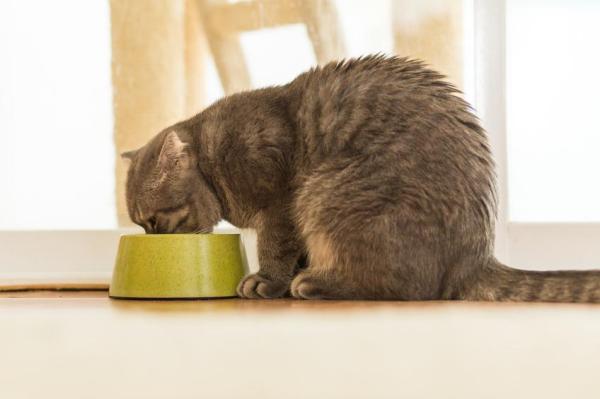
8. Does your cat scratch a lot?
If your cat is scratching a lot, it is a likely sign they have parasites. Fleas are perhaps the most frequent,but there are many types of external parasites such as ticks and mites which will cause your cat to scratch more than usual. With parasites like this, prevention is always better than cure. This is why it is best to treat your cat with antiparasitic treatment such as back of the neck flea ointment or a flea collar. Ensuring they have an adequate deworming schedule is also important.
Fleas and other insects won't just make your cat unhappy, but they can infest the rest of your house and fabrics. There are some homemade treatments to get rid of fleas, but severe infestations will need to be treated by a vet.

9. Have your cat's mucous membranes changed?
When a feline (like many animals) is ill, then their mucous membranes can tell a lot. The most obvious mucous membrane on your cat will be their gums. If they are too pale or too dark (i.e. red and swollen), then this is one of the signs which can tell you something is wrong. It may be poor general health, but it can also be a sign of something quite serious like feline leukaemia. If your cat's gums are sensitive or have changed in a noticeable way, you should contact your vet immediately.
This article is purely informative. AnimalWised does not have the authority to prescribe any veterinary treatment or create a diagnosis. We invite you to take your pet to the veterinarian if they are suffering from any condition or pain.
If you want to read similar articles to How to Know if My Cat is Sick, we recommend you visit our First aid category.